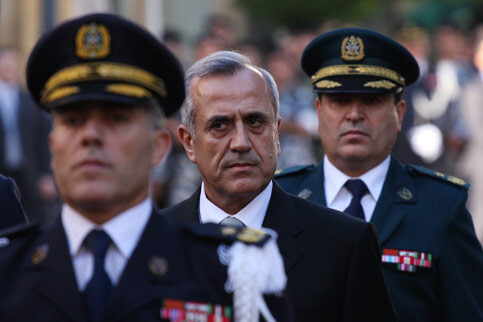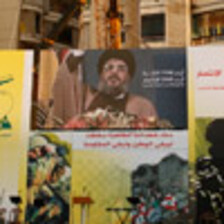Electronic Lebanon 24 September 2008

Lebanese President Michel Suleiman leads a divided government struggling to achieve unity. (Matthew Cassel)
BEIRUT (IPS) - The Lebanese unity government has finally came to terms with its ministerial declaration after weeks of political haggling. What promises and threats does the incoherent declaration hold for Lebanon in a polarized local and regional context?
“The ministerial declaration is an impossible document that carries many contradictions,” says Oussama Safa, director of the Lebanese Center for Political Studies, a local Lebanese think tank.
The declaration, which was passed by parliament on 12 August, underlined the program of the newly formed cabinet in the wake of the 21 May Doha Accord. The agreement put an end to a week-long war between the pro-Western and Arab parliamentary majority — comprised of the Christian Kataeb and Lebanese Forces, the Sunni Future movement and the Progressive Socialist Party — and the pro-Syrian and Iranian opposition, which includes the Shia Hizballah and Amal parties as well as the Christian Free Patriotic Movement.
“The Lebanese people hope that our coalition within this government, the government of unifying national will, will lead us out of the crisis and away from the dangers of division, towards calm and open assembly and dialogue,” said the ministerial declaration.
In essence, the document resembles the previous 2005 ministerial declaration, which became highly controversial after the eruption of the 2006 war between Hizballah and Israel. Legitimizing the military activity of the Lebanese resistance, it was denounced by the majority.
“As the document is very similar to the last declaration, it bears the same wounds. However, the main difference resides in the fact that this particular government is only a transitory one that will only lead Lebanon until the next parliamentary election in less than a year,” says Safa.
Many leaders have found the document incoherent. While the document emphasizes its “adherence to the principle of the state’s unity and referential status in all matters concerning the country’s public policy,” it also underscores “the right of Lebanon’s people, army and Resistance to liberate or recover the Shebaa Farms, the Kfar Shouba Hills and the Lebanese part of Ghajar [areas still under Israeli occupation] and defend Lebanon and its territorial waters in the face of any enemy and by all available and legitimate means.”
The declaration also highlights a fundamental contradiction when it goes on to endorse the implementation of UN resolution 1701, which put an end to the 2006 war and calls for the disarmament of all Lebanese military groups.
According to Safa, the new ministerial declaration does not grant the right of resistance to Hizballah, and uses ambiguous language that leaves much room for interpretation.
“This document makes sure that all factions appear like winners; it is highly unlikely that the new cabinet will implement the program it has set. The economy is being managed as it was before, and controversial issues such as the privatization of key economic sectors [namely, electricity and telecom companies] will be postponed until the local balance of power is redefined by new elections.”
In addition to acting as a caretaker government, the new cabinet will ensure the passing of the new electoral law as well as the appointment of senior military posts left vacant. “The government is also committed to organizing parliamentary elections on time and according to the new law that will be ratified by the parliament in accordance with the Doha Agreement,” says the declaration.
Safa believes that the electoral law will most likely remain a bone of contention between feuding political factions. “Hizballah is determined the elections take place on time as it will most likely win the majority of seats along with its allies. However, it is still too early to speculate; the election’s outcome also depends on the formation of future coalitions.”
Safa also draws attention to the impact of the national dialogue to be held next month. Its pivotal role was reiterated in the declaration, which mentioned “the parties’ adherence to the principles of the Lebanese constitution and the Taif Agreement (that ended the 1975-1990 civil war), and the call for a national dialogue headed by the president in partnership with the Arab League.”
A first round of national dialogue regrouping rivaling Lebanese factions was held in 2006 in an attempt to resolve some of Lebanon’s controversial issues. The second round was held earlier this month before being postponed until October. “Unfortunately, national dialogue will become the main vehicle driving parliament and cabinet activity this year,” Safa adds.
All rights reserved, IPS - Inter Press Service (2008). Total or partial publication, retransmission or sale forbidden.





